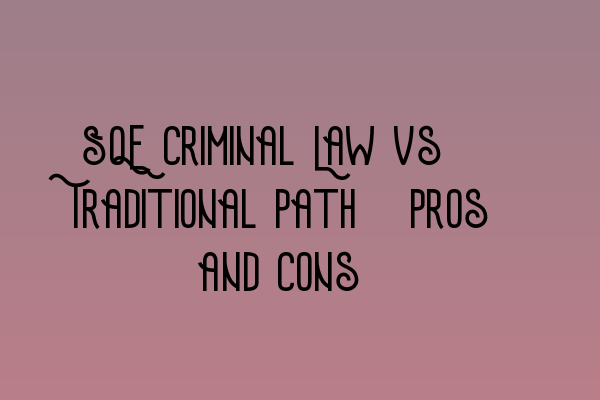SQE Criminal Law vs. Traditional Path: Pros and Cons
Choosing the right path to become a qualified solicitor in the field of criminal law can be a daunting decision. With the introduction of the new Solicitors Qualifying Examination (SQE) in the UK, aspiring solicitors now have an alternative route to consider. In this blog post, we will explore the pros and cons of the SQE Criminal Law path compared to the traditional route, helping you make an informed choice.
Pros of the SQE Criminal Law Path
1. LLC Formation Made Simple: Step-by-Step Guide for UK Entrepreneurs – One of the major advantages of the SQE Criminal Law path is the flexibility it offers. Unlike the traditional route, which requires a specific undergraduate degree in law, the SQE allows individuals from diverse academic backgrounds to qualify as solicitors. This opens up opportunities for those who have studied related subjects or have relevant work experience in the criminal justice system.
2. Business Regulations in the UK: A Comprehensive Overview – The SQE also offers a more streamlined and cost-effective approach to qualifying as a solicitor. Instead of the traditional two-year training contract, the SQE requires candidates to complete two stages of assessments, which can be completed within a shorter timeframe. This can help reduce the financial burden associated with the traditional path, making it more accessible for aspiring solicitors.
3. SQE Workshops and Webinars: Accelerate Your Exam Preparation – Another advantage of the SQE Criminal Law path is the focus on practical skills and competencies. The assessments are designed to test a candidate’s ability to apply legal principles in real-world scenarios, making them more relevant to the day-to-day practice of criminal law. This can provide a more hands-on and experiential learning experience compared to the theoretical approach of the traditional route.
Cons of the SQE Criminal Law Path
1. Delaware Corporate Law for UK Solicitors: Key Insights and Practices – One of the drawbacks of the SQE Criminal Law path is the lack of specialization. Unlike the traditional route, which allows candidates to choose electives and specialize in specific areas of law, the SQE Criminal Law path provides a general qualification. This may limit career opportunities for those who wish to specialize in niche areas of criminal law.
2. Demystifying the Solicitors Qualifying Examination Format – Another potential disadvantage is the uncertainty surrounding the new SQE assessments. As the SQE is a relatively new qualification, there may be initial challenges and uncertainties in adapting to the new format. Candidates may need to invest extra time and effort in understanding the assessment requirements and preparing adequately.
3. SQE Workshops and Webinars: Accelerate Your Exam Preparation – Lastly, the transition from the traditional route to the SQE Criminal Law path may require candidates to invest additional time and resources in preparing for the new assessments. This can be a significant commitment, particularly for those who have already started their journey through the traditional route.
Conclusion
Ultimately, the choice between the SQE Criminal Law path and the traditional route depends on individual circumstances and preferences. The SQE offers flexibility, cost-effectiveness, and a focus on practical skills, making it an attractive option for many aspiring solicitors. However, the lack of specialization and uncertainties surrounding the new format may be a concern for some. It’s important to carefully consider your career goals and weigh the pros and cons before making a decision.
